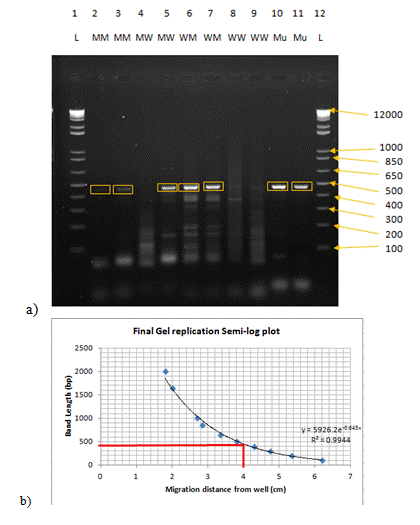Student Research Projects from Fall 2011
In Fall 2011, 9 student research teams were challenged to propose and pursue a single focused research project for the semester. All students picked a genetic/gene-linked disease and designed PCR-based
diagostic assays for mutations known to cause that disease. Each group wrote manuscripts gave numerous talks. This semester was novel in that (i) the course was kept very small, like a seminar class,
(ii) the reseach assignment involved an extra "control" experiment, where each group was required to also find an existing published PCR assay for the same gene and replicate the experiment using the published primer sequences.
These are often referred to as the "control" primers in the final reports/manuscripts, and (iii) the student groups were also required to create short documentary films, only 5-minutes in length, using still photos to communicate the findings of their "30 Days" sociological experiment
(see links to YouTube, often at the bottom of each group's website).
Student websites reporting their findings at the end of the independent investigations from Fall Semester 2011
Hyperlipidemia: ASPCR Detection of the Point Mutation N291S in the LPL Gene in Homo sapiens DNA with Familial Combined Hyperlipidemia
Progeria: Detection of the Single Base Mutation, C1824T, in the LMNA Gene, in Human Cells Using Yaku and PCR Methods.
Spinal Muscular Atrophy: Identification of Spinal Muscular Atrophy Type I in Homo sapiens Using PCR and Gel Electrophoresis
Spinal Muscular Atrophy: 4-Primer PCR assay amplifies exon 8 in SMN1 for SMA patients using human Buccal Cells.
Amyotrophic lateral sclerosis/Lou Gehrig's disease (ALS): PCR Genotypic Identification of the A4V Mutation on the SOD1 Gene using Human S9 cells.
Angelman Syndrome: MMG Final Paper
Galactosemia: PCR detection of the N314D mutation on the GALT gene for Galactosemia Type I in S9 human epithelial cells
Hypertrophic Cardiomyopathy: Genotypic Identification of the MYH7 R403Q Mutation using PCR on Human S9 Epithelial Cells yields negative results
Krabbe Disease: Designing a Diagnosis of Krabbe Disease using PCR to detect a 30 kb deletion on the GALC Gene of Human Epithelial Cells





